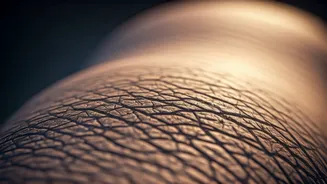Dullness & Unevenness Unveiled
Dehydration's effects on the skin are often first seen in its overall appearance. Insufficient water intake often results in a complexion that lacks its natural
luminosity and appears dull. The skin's texture may also become uneven, making it look less smooth. Regular hydration ensures the skin functions properly and maintains a healthy appearance, promoting a radiant and even complexion. This helps in achieving a smoother skin texture and a natural glow, avoiding the dullness and unevenness caused by a lack of water.
Lines and Wrinkles Enhanced
The appearance of fine lines and wrinkles is often exacerbated by dehydration. Water plays a vital role in maintaining the skin's elasticity and firmness. When the body lacks sufficient water, the skin's structure weakens, making existing wrinkles more noticeable. The skin's ability to bounce back and maintain a youthful appearance decreases when it lacks moisture. Staying hydrated helps to plump up the skin, reducing the visibility of these signs of aging. It ensures that the skin remains supple and resilient, thereby minimizing the appearance of fine lines and wrinkles.
Inflammation & Redness Rise
Dehydration can also intensify inflammation and redness in the skin. When the body is dehydrated, it struggles to manage its internal processes, including those that regulate inflammation. This can lead to increased sensitivity, redness, and irritation. Proper hydration is essential for maintaining the skin's protective barrier and reducing inflammation. It helps to keep the skin calm and balanced. This reduces the likelihood of flare-ups and promotes a clearer, healthier complexion. Adequate hydration supports the body’s natural anti-inflammatory processes.
Circulation Slows Down
Reduced water intake can significantly slow down circulation, negatively impacting the skin tone. Proper blood circulation is crucial for delivering nutrients and oxygen to the skin cells. When the body is dehydrated, blood flow is compromised, leading to a dull, tired appearance. Regular hydration helps improve blood circulation, giving the skin a healthy glow. Enhancing circulation helps the skin get all the essential elements it needs to function correctly, leading to a healthier, more vibrant look. Sufficient water intake is therefore key to supporting the skin's natural processes.
Oil Production Imbalance
Dehydration can also disrupt the skin's oil production, sometimes leading to an increase in oiliness. When the skin lacks sufficient hydration, it may overcompensate by producing more oil to compensate for the dryness. This can result in a shiny appearance and potentially lead to clogged pores and breakouts. Adequate hydration helps to regulate the skin's natural oil production, maintaining a healthy balance. It promotes clearer skin and helps prevent issues related to excessive oiliness, such as acne. Proper hydration ensures that the skin functions efficiently.
Weakening Skin Barrier
The skin’s natural barrier starts to weaken when there is a lack of water in the body. This barrier is essential for protecting the skin from environmental stressors and retaining moisture. Dehydration compromises the skin barrier, making it more vulnerable to damage and dehydration. This can lead to increased sensitivity, dryness, and a higher risk of irritation. Staying hydrated strengthens the skin’s barrier function, helping it to effectively protect against external threats and maintain optimal moisture levels. Adequate water intake is essential for promoting overall skin health and resilience.














